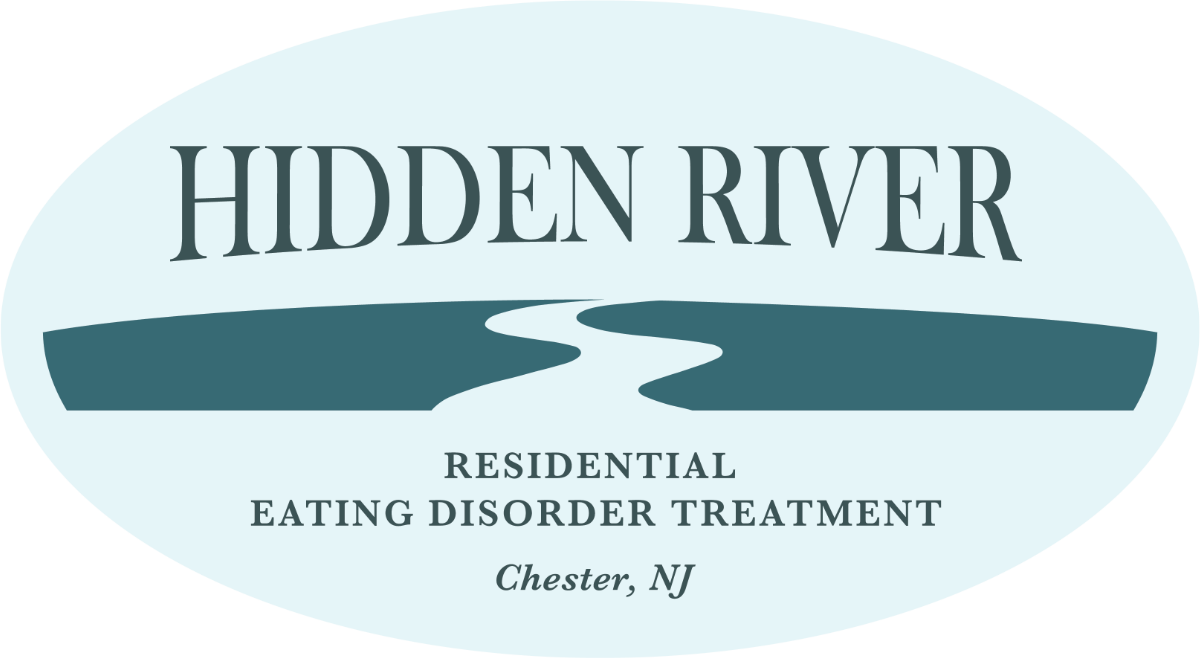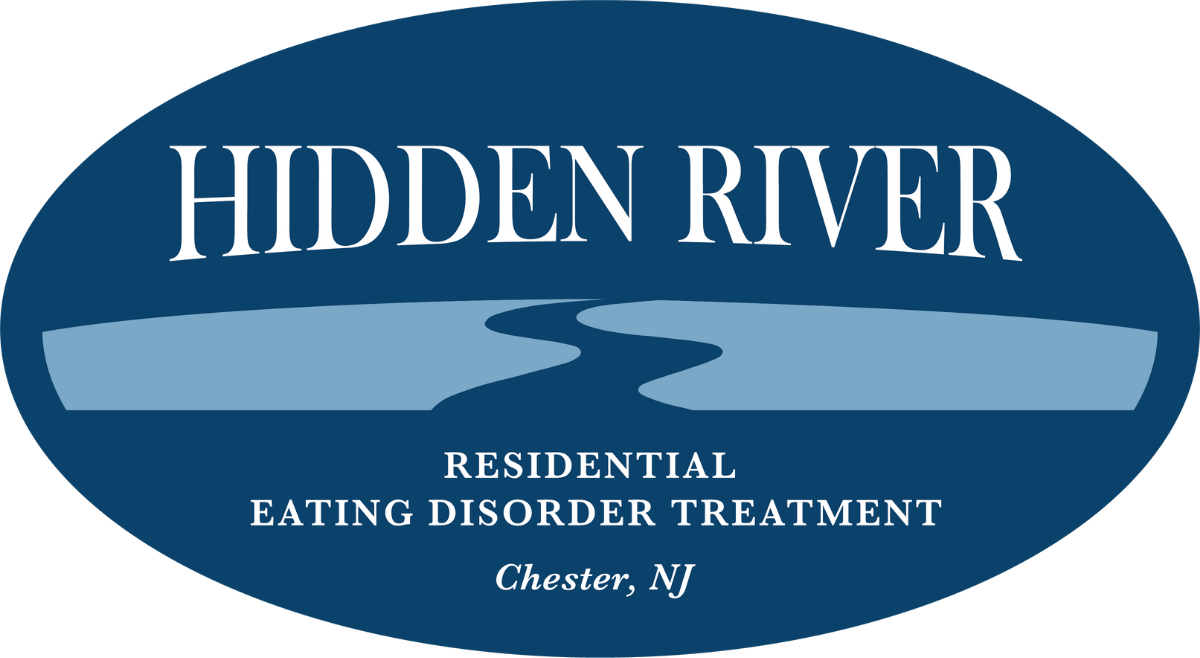Frequently Asked Questions
Are family members involved in treatment?
Hidden River’s team believes patients’ family members and support systems are a key part of the treatment process. We encourage our patients to involve their families and encourage family members to participate in their loved ones’ treatment.
Can a patient follow a vegetarian diet while healing at Hidden River?
Hidden River will be able to accommodate vegetarian diets for those who were vegetarian prior to the onset of the eating disorder. We cannot accommodate vegan diets.
How does Hidden River accommodate patients with food allergies?
Upon receiving proper documentation, we will tailor the meal plan in accordance with the patient’s allergies and/or verified intolerances.
How does the facility accommodate patients that follow a Kosher diet?
We are providing Kosher meal options for those who follow a Kosher diet. There will be separate dishes and utensils for the Kosher meals as well.
What is a typical length of stay in residential treatment?
A patient’s length of time in treatment is determined based on their medical condition, psychiatric needs, and their individualized treatment goals. The standard length of stay varies based on medical necessity and may be longer or shorter depending on the medical and psychiatric progress of the patient.
Will patients be allowed to have personal electronics during their treatment stay?
Telephones:
Facility telephones are provided. Calls to and from family will be scheduled. All cell phones are kept in a secure cabinet and are not made available. Children and adolescents are recommended to leave their cell phones at their family residence. Adults may bring their phone. It will only be made available briefly to obtain contact information about family and for managing finances.
Laptops:
Laptops are permitted for school use. Middle School and High School Students may use the facility desktop computers. College students may access their laptop during designated study periods.
Tablets:
Tablets are not permitted.
Smart Watches:
Smart Watches are not permitted.
Cameras:
Cameras are not permitted.
How will outside providers be updated on a patient’s treatment progress?
Patients who have established providers in an outpatient or other setting can expect the Hidden River treatment team members to contact and coordinate care with their treatment providers throughout their stay. A written parental consent (for patients under 18 years of age) or individual written consent (for patients 18 years of age or older) will be required.
What happens to prepare a patient for discharge?
Starting upon admission, the treatment team, patient, and involved family members will discuss the preliminary aftercare recommendations. It is important that provisions for the appropriate treatment resource that will support the patient’s recovery be continued after discharge. Depending on individual needs, a patient will be discharged to the qualifying level of care, which may include partial hospitalization, intensive outpatient, traditional outpatient, or inpatient. The patient’s psychiatrist, primary therapist and registered dietitian will assist in the discharge planning process and will help to identify the appropriate level of care. Patients with an established treatment team are typically referred back to those providers or that program. The Hidden River team will communicate with outside providers prior to discharge to ensure that a smooth transition is arranged.
Can siblings, friends, and/or pets come for a visit to Hidden River campus?
The clinical team will review all visitations prior to their occurrence. Patients who are 12 – 17 may have visitation from immediate family members only. Patients who are 18 – 20 may have visitation from immediate family members. Exceptions to this are limited and must be reviewed and pre-approved by the leadership team prior to their occurrence. Visitors must be at least 8 years old, and visitors ages 8 through 17 must be accompanied by a parent/guardian. Personal pets are not permitted on the campus at Hidden River.
What is the patient schedule?
The patients participate in a seven-day clinical schedule which begins at 7:00am and ends at 6:00pm. There are multiple group therapy, education, and skills training sessions throughout each day. The evenings are opportunities for relaxation and social activities.
What is patient schooling?
Please navigate to our School Program page for more information.
Does Hidden River accept insurance?
Insurance coverage will be verified as the first step of the admission process. Please complete our insurance form here. Once that is complete, the family will be provided with information and a financial breakdown of deductibles and maximum out of pocket costs. Hidden River accepts most insurances. We negotiate Single Case Agreements with most insurance carriers allowing patients to use their in-network benefits for treatment. The admission team is available to answer initial insurance questions.
Are children/adolescents separated from adults?
Patients who are aged 17 and below are housed together. Patients who are 18 and older are housed together. When appropriate, some of the therapy and education sessions combine the age groups.
Who may the patient have contact with while in treatment?
11-17 may have communications with immediate family members. 18+ may have communication with immediate family members.
How are medications managed for children/adolescents?
Upon completing thorough medical and psychiatric assessments, the medical team may recommend the use of medication to gain stability and begin progression to health. Parents of children 17 and below will be educated on the recommendations and provided with the opportunity to make an informed decision regarding the use of all medications.
About
Eating Disorders Treated
If you or a loved one suffer from an eating disorder, we can help. Please contact us at info@hiddenriverhealing.com or 908.895.4931 ext. 203.
People with Anorexia Nervosa restrict their food intake relative to their needs, leading to significantly low body weight for their age, sex, level of development or general health. Often there is intense fear of gaining weight or becoming fat, even though one might be underweight. There is also typically a disturbance in the way in which one’s body weight or shape is experienced, excessive importance placed on weight or shape, or denial of the seriousness of the low weight despite the risk or presence of medical complications. Binge eating or purging may also occur during Anorexia Nervosa.
Individuals with ARFID limit or avoid eating certain foods (for example, avoiding foods with specific sensory qualities or due to fear of negative consequences other than weight gain),often resulting in significant weight loss and/or nutritional deficiencies. ARFID does not involve the disturbance in the way in which one’s body is experienced or fear of weight gain that is typically seen in Anorexia Nervosa.
This disorder involves engaging in repeated episodes of binge eating. Binge eating consists of eating a large amount of food, more than most people would eat, in a discrete period of time and feeling out of control while eating. In Binge Eating Disorder, binging episodes typically include eating more rapidly than normal, eating until uncomfortably full, eating large amounts when not feeling physically hungry, eating alone, and/or feeling guilty or disgusted after eating. The diagnosis is not made on the basis of weight.
Bulimia Nervosa involves engaging in repeated episodes of binge eating followed by compensatory behaviors that are attempts to alleviate or avoid the psychological or physical effects of binging (e.g., weight gain). Binge eating refers to eating a large amount of food, more than most people would eat, in a discrete period of time and feeling out of control while eating. Compensatory behaviors may include self-induced vomiting, laxative or diuretic misuse, or excessive exercise. Bulimia may or may not result in weight gain.
This term describes feeding or eating behaviors that interfere with proper nutrition intake and cause distress or impairment in daily living but do not meet full diagnostic criteria for any of the other eating disorders. These behaviors may involve multiple features of one disorder or features of several disorders, and may lead to inability to maintain weight. Conditions categorized as OSFED still can be so severe that they warrant treatment with an eating disorders professional, or management in higher levels of care than traditional outpatient treatment.
About
Co-Occurring Conditions
Please note that treatment for a co-occurring condition may be simultaneous and within the same treatment approach provided for eating disorder care. However, recovery from one disorder does not guarantee recovery from another disorder, so it is imperative to seek help for both.
Depression is a mood disorder that causes constant feelings of sadness and loss of interest. It impacts how an individual thinks, feels, and behaves, leading to numerous interrelated emotional and physical problems. A 2018 research review shows that depression and anorexia nervosa frequently occur together. Additionally, a study from 2021 reveals that people with depression often experience more severe anorexia symptoms, including weight loss or low body weight, increased hospitalizations, and a longer time living with the eating disorder. Furthermore, a 2019 study concludes that for binge eating disorder, depression symptoms reduce self-control and decision-making ability.
Anxiety describes a form of restlessness or the need to react to some kind of stressor combined with a failure to take action and resolve or remove the stressor. More often than not, anxiety and eating disorders go hand-in-hand. One study found that two-thirds of individuals with eating disorders also suffer from anxiety, with 42 percent of that group developing anxiety as a child, which may be well before the start of their eating disorder.
Self-injuring behaviors for eating disorder patients include self-induced vomiting, diuretic or laxative misuse, excessive exercise, cutting, pinching, hitting, severe calorie restriction, or binge eating until discomfort or pain. One study found that 27.3 percent of individuals with an eating disorder also report self-injuring behavior, with the percentage being even higher for individuals with bulimia nervosa (32.7 percent). Another study revealed that four out of five individuals with self-injuring tendencies reported at least one eating disorder behavior in the past week, with binge eating being the highest (57.6 percent).
Obsessive-compulsive disorder (OCD) is the most common anxiety disorder to be linked to eating disorders, with one in six people with an eating disorder also having OCD (15 to 18 percent). Furthermore, people diagnosed with eating disorders are up to 69 percent more likely to develop OCD. Individuals suffering from both conditions tend to develop compulsive rituals connected to their food, such as weighing food before a meal, moving it around on their plate in a particular way, or cutting it into tiny pieces.
The correlation between post-traumatic stress disorder (PTSD) and eating disorders is well-documented. Individuals with traumatic histories often feel a sense of powerlessness or loss of control, and purposefully starving themselves, binging, or purging their meals is a way for them to regain authority over their lives. In a 2013 study, researchers found that 23.1 percent of patients with anorexia nervosa and 25.5 percent of those with bulimia nervosa also suffered from PTSD. Furthermore, more traumatic exposure directly links to more severe eating disorder symptoms.
Up to 50 percent of people with eating disorders also struggle with substance abuse of drugs and/or alcohol, which is a rate five times higher than the general population. These individuals may begin using substances before, at the same time as, or after eating disorder symptoms appear. The substances most commonly abused by eating disorder patients are alcohol and nicotine. A 2021 study of college students indicated that a positive eating disorder screen was most strongly associated with methamphetamine use and any lifetime eating disorder diagnosis was most strongly associated with benzodiazepine use. Furthermore, a 2022 study revealed that the combination of an eating disorder with substance abuse is particularly deadly because the risks of death from one are compounded with the other.
Connect with Us
Sign up for newsletter & be part of the community.
Receive our monthly newsletter including current blogs, articles, and an inside look at Hidden River Healing.


